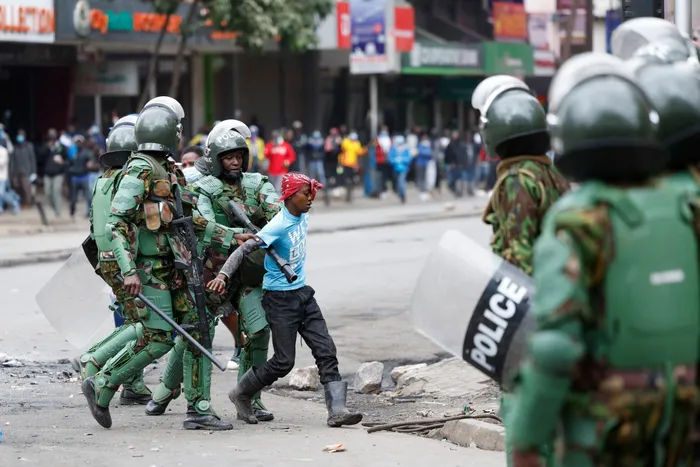Youth Awakening in Africa and an unprepared Continent

Kenyan anti-riot police detain a young man during a planned demonstration after a nationwide deadly protest against a controversial now-withdrawn tax bill left over 20 dead in downtown Nairobi, on June 27, 2024. Picture: Simon Maina / AFP
By Cliff Mboya
Africa is experiencing a youth awakening of revolutionary depths but African leaders are not demonstrating comparable enthusiasm to match their vitality. Battle lines have been drawn and many policy makers on the Continent are yet to appreciate the potency that this generation possesses and are often caught by surprise when they wield their power.
The activism and agency of young people across the Continent in politics, social issues, entrepreneurship and technological innovation is unprecedented. They are becoming a political force, advocating for transparency, accountability and good governance.
The latest battle zone is in Kenya where President William Ruto’s administration is facing nationwide protests over a finance bill that sought to impose a heavy tax burden on citizens in attempts to implement IMF reforms.
In exchange for a bailout programme agreed in 2021, Kenya committed to increase revenue collection to 25 percent of gross domestic product, slash debt and cut wastage. Ruto came into power in 2022 and embarked on painful reforms that included new and increased levies on housing, gasoline, medical and vehicle insurance, sanitary towels, bread, online money transactions among other punitive tax measures.
“There are no soft solutions to this. We have a huge debt. We have a huge deficit. We are living beyond our means,” the prime cabinet secretary, Musalia Mudavadi argued, “And to stop the haemorrhage is for us to broaden the tax base and enhance revenue collection, so that we can minimise the damage we have been causing by borrowing all the time,” Mudavadi added.
However, social media is awash with memories of the painful structural adjustments programs (SAPs) in the 90’s that caused massive privatisation and retrenchment of thousands of civil servants in the country and debates on anti-welfare and insensitive IMF prescriptions.
Word going round is that “the administration has surrendered to the IMF and World Bank and ignored the feelings of the people”, said Macharia Munene, a professor of history and international relations at the United States International University in Nairobi.
“Kenya is not IMF’s lab rat”, a placard read. What started as online rage against runaway wastage among government officials quickly exploded into street protests by the younger generation of youths, better known as Gen Z.
The street protests by the youths were partly stirred by contempt by the same state officials. “Politics is a contact sport. Digital activism is just wa***ng. Any jack*** can kick down a barn but it takes a good carpenter to build one,” said the president’s economic advisor.
Moreover, the majority leader in parliament dismissed the protesters as “privileged Nairobi urbanites with iPhones, arriving for protests in Uber rides, eating KFC chicken and drinking bottled water”.
Soon afterwards, the protests had spread countrywide with Gen Z motivated to take responsibility and prove their mettle. They mobilised online, fund-raised, co-ordinated transportation, water points, shared educational resources, used AI to design interesting and educative messages and a division of labour with unexpected sophistication for their age.
They are hacking government sites, sharing personal contacts and business of members of parliament and the executive, created a list of shame and promised to hold individuals personally accountable. They replaced public preachers on public transport and are preaching anti-Ruto gospel in buses, trains and airplanes using funds mobilised online.
Threats from the President and police killings only fuelled the fire and escalated the situation to precarious levels. Even after President Ruto capitulated and rejected the Finance bill, they have vowed to continue protesting to demand more accountability, good governance and political freedom.
The once unyielding President has promised to listen to their concerns while legislators who voted for the controversial bill are apologising to their constituents and asking for forgiveness.
The “Gen Z protests” in Kenya caught the establishment by surprise They have previously been accused of indifference to their civic duties and addiction to online entertainment and gossip. However, recent events prove that this is an assertive generation that is informed and skilled enough to organise and disrupt the establishment if their voices and interests are not heard and acknowledged.
This should serve as a warning to the political establishment in Africa. Having the youngest population in the world with a median age of 19.7 years, presents significant opportunities and challenges. With greater access to information, education and skills, many see a world of opportunities beyond what the current leadership can offer.
Nairobi, Lagos and Cape Town are becoming hubs for start-ups fostering innovation and driving new tech that sometimes, existing governments have not matched up in terms of policy support and innovation.
Movements like “Y’en a Marre” in Senegal, “EndSARS” in Nigeria and “FeesMustFall” in South Africa are tell-tale signs of a youth on the move. We must remember the role of young people in the Soweto Uprising of 1976 that disrupted the apartheid establishment and galvanised the freedom movement, the RhodesMustFall 2015 movement against symbols of colonialism and oppression and other contemporary youth activism that is taken for granted by the establishment.
Gen-Z is a force to reckon with and the sooner we begin to respond to their demands and interests, the better for the long-term social and economic stability on the Continent.
* Cliff Mboya is the postdoctoral fellow at the Centre for Africa-China Studies at the University of Johannesburg
** The views expressed in this article are not necessarily those of The African
Related Topics: